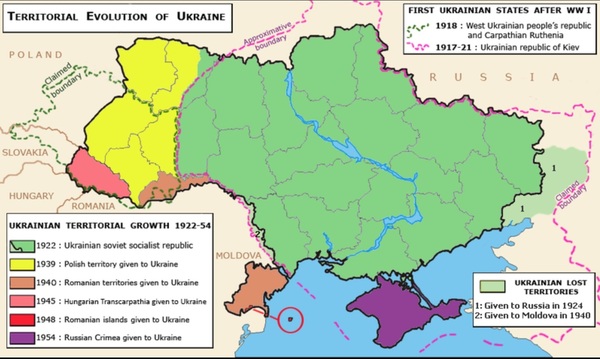
–>
September 24, 2022
After Russia announced partial mobilization, which effectively doubled the Russian forces to be engaged in Ukraine, politicians, government officials, and analysts proclaimed that the action was a sign of Russian failure, weakness, and desperation. Be that as it may, the West once again has demonstrated aloofness from history and a refusal to face the reality that regardless of the amounts of weaponry, international sanctions, and billions in financial assistance, the West cannot defeat Russia. Hitler couldn’t do it. Embracing unrealistic expectations will inevitably lead to complete distraction and eventual dismemberment of Ukraine.
‘); googletag.cmd.push(function () { googletag.display(‘div-gpt-ad-1609268089992-0’); }); }
The war exposed Ukraine to two of her most critical vulnerabilities – questionable legitimacy and extreme nationalism. Legitimacy derives from acceptance and recognition. However, Ukraine’s neighbors Russia, Poland, and Romania do not accept their current borders with Ukraine.
After the Second World War, the borders of artificially created countries such as Czechoslovakia, Yugoslavia, and Ukraine were delineated to replicate the geopolitical engineering. So, when Ukraine proclaimed her independence, she did not proclaim her independence from Russia, Poland, and Romania’s territorial claims.
Indeed, the historical provenance of Ukraine is problematic. In a nutshell, before declaring independence in 1991, Ukraine had never been a unified state. What was to become Ukraine joined Russia in 1654 when Bohdan Khmelnitsky, a Hetman of the Zaporozhian Host, petitioned Russian czar Alexey to accept the Zaporozhian Host into Russia. The army and a small territory under Hetman’s control that Russians called “u kraine,” which means in Russian “at the edge;” the term originated in the twelfth century to describe lands on the border of Russia that were incorporated into Russia. The Zaporozhian Host administration was recognized as an organ of the Russian state.
‘); googletag.cmd.push(function () { googletag.display(‘div-gpt-ad-1609270365559-0’); }); }
After the Bolshevik revolution, Lenin in 1919 created the socialist state of Ukraine on part of the territory of the former Russian Empire. In 1922 Ukraine became Ukrainian People’s Republic with the capital Kharkov within a newly created Soviet Union. The new territory included Donetsk, and Lugansk regions becoming Eastern Ukraine. In 1934 Kiev became the capital of the Ukraine Soviet Socialist Republic.
In 1939, as a result of the Nazi-Soviet Pact, Stalin annexed the eastern territories of Poland with the city of Lvov and incorporated them into Ukraine. In June of 1940, he annexed Northern Bukovina from Romania and merged it with Ukraine. In 1945 Hungarian Carpathian Ruthenia, nowadays Zakarpattia, was incorporated into the Soviet Union and added to Ukraine. Now these territories are known as Western Ukraine.
After the disintegration of the Soviet Union, Ukraine got its borders within which she achieved independence and millions of Russians, Poles, Hungarians and Romanians were trapped in a newly created country. via

Spiridon Ion Cepleanu via Wikipedia CC BY-SA 3.0
The Ukrainian problem is greatly exacerbated by the fact that unlike pluralistic societies such as the USA, Canada, Switzerland, and Russia, which are tolerant of different cultures, religions, and languages, Ukraine is not. Unsurprisingly, devotion to pluralism proved not to be her forte. Even though the Kiev regime had no historical roots in the real estate it inhabited, it imposed Ukrainian rules and the Ukrainian language on non-Ukrainian people after declaring independence. It is worth pointing out that even in the Soviet Union, where Russian was the official language, the Ukrainian language and literature were compulsorily studied by everyone in Ukraine.
As a result, pro-Russian sentiments – ranging from the recognition of the official status of the Russian language to outright secession – have always been prevalent in Crimea and Eastern Ukraine. Western Ukraine has always gravitated toward its Polish, Romanian, and Hungarian roots. Emphatically anti-Russian, Poland may not miss this strategic opportunity to re-acquire its land and avenge the humiliation inflicted by the Yalta Conference.
During the conference in Crimea in 1945, the leaders of the free world, Roosevelt and Churchill, legitimized the annexations by affirming Soviet ownership over the Polish and Romanian territories.
‘); googletag.cmd.push(function () { googletag.display(‘div-gpt-ad-1609268078422-0’); }); } if (publir_show_ads) { document.write(“
It was a cold-blooded betrayal for the Poles, who, unlike the Romanians who fought on the Germans’ side, suffered horribly under German occupation and heroically fought for independence. Roosevelt and Churchill destined the Poles to the horrors of Stalin’s mass-murdering tyranny for a half-century.
Hence, every time the Western leaders defend the territorial integrity of Ukraine, they reaffirm the immoral outcome of the Yalta conference. Western Ukraine does not belong to the Kiev regime, just as Eastern Ukraine is not Ukraine.
The West’s insistence on maintaining the status quo of the Ukrainian borders established by Lenin, Stalin and Hitler exposes the disconnect between strategic doctrine and moral principles.
Indeed, Poles make no secret of their ambitions. Polish President Andrzej Duda, recently declared, “For decades, and maybe, God forbid, for centuries, there will be no more borders between our countries – Poland and Ukraine. There will be no such border!”
On May 22, Volodymyr Zelensky announced that he would submit to the Rada a bill on the special legal status of Polish citizens in Ukraine. The bill grants Polish citizens unprecedented civil and political rights in Ukraine. It empowers Polish citizens with the right to be elected in Ukraine and apply for the position of judges, including constitutional judges. The agreement provides for integrating the security forces and law enforcement agencies. The Polish press calls it a “soft annexation” of Western Ukraine.
Romania is not far behind, especially in light of many inhabitants of former Northern Bukovina already carrying Romanian passports.
The territory of Ukraine is a mosaic of other people’s lands. If we want to stop this insane war and ensure peace in Europe, instead of calling Russia’s sponsored referendum in Eastern Ukraine a sham, we should conduct an honest referendum in all the disputed territories under the auspices of the UN and let the people decide what government they want.
Woodrow Wilson, the architect of the principle of self-determination, would enthusiastically endorse the populaces’ desire, as he wrote: “National aspirations must be respected: people may now be dominated and governed only by their own consent.”
Alexander G. Markovsky is a senior fellow at the London Center for Policy Research, a conservative think tank that examines national security, energy, risk analysis, and other public policy issues. He is the author of Anatomy of a Bolshevik and Liberal Bolshevism: America Did Not Defeat Communism, She Adopted It. Mr. Markovsky is the owner and CEO of Litwin Management Services, LLC. He can be reached at [email protected]
<!– if(page_width_onload <= 479) { document.write("
“); googletag.cmd.push(function() { googletag.display(‘div-gpt-ad-1345489840937-4’); }); } –> If you experience technical problems, please write to [email protected]
FOLLOW US ON
<!–
–>
<!– _qoptions={ qacct:”p-9bKF-NgTuSFM6″ }; ![]() –> <!—-> <!– var addthis_share = { email_template: “new_template” } –>
–> <!—-> <!– var addthis_share = { email_template: “new_template” } –>






